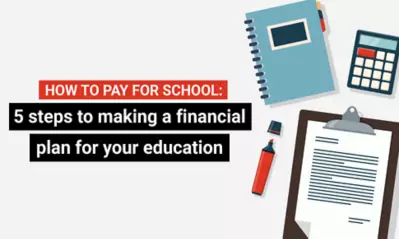What is financial literacy and why should you care?

Written by Dawn Handschuh

Reviewed by Chris Conway, Director of Financial Education Initiatives and Repayment Management

Listen to article
What is financial literacy?
Financial literacy is an umbrella term used to describe the knowledge that enables people to manage their personal finances.
In short, financial literacy means you have the knowledge (or know how to find the necessary information) to make smart decisions about money.
These skills will prove useful throughout your life, whether you’re seeking a loan for a new car, funding your college education, deciding where to invest your long-term savings, paying off debt or planning your retirement.
Here, we’ll dive into what financial literacy looks like and how you can cultivate it in your own life.
Financial literacy for beginners
Financial literacy encompasses a broad range of personal finance areas:
- Day-to-day spending
- Management of credit usage and outstanding debt
- Savings and investments
- Retirement plans
- Estate plans
Financially literate individuals have a good grasp of where they stand. They may even have a written plan that will help them get where they want to be in one year, five years, 10 years or beyond.
For many years, financial literacy was not taught in high school, although a growing number of states now require personal finance courses as a graduation requirement. As a result, unless you majored in accounting or finance in college, you probably never received formal instruction on how to manage your personal finances.
That said, financial literacy is not only important for everyday savings. It is also critical for those considering going back to school. There are a variety of ways to fund your education, and your choice can affect your future. University of Phoenix is dedicated to helping you understand the ways you can save on a college degree.
Let’s take a closer look at the five most important aspects of financial literacy.
1. Spending and budgeting
Before you can plan for the future, you need to take stock of where you are now. Do you know what your total monthly income is and where that money goes? If not, it can be very helpful to track your income and expenses for a month or two to gain a better understanding of your spending habits.
Commit to recording every expenditure you make. Begin by collecting and saving receipts for things you pay for, then document your spending on a spreadsheet, creating appropriate categories like insurance, phone bills, internet access, electricity, clothing, dining out, out-of-pocket medical expenses, groceries, gifts and so on. Don’t forget to include online purchases or recurring bills where you’ve set up auto pay. If you prefer, you can use a free app like Mint or one offered by your bank.
Once you’ve documented everything, you can begin your analysis.
- What are your biggest bills each month?
- Are these essential expenses or discretionary spending?
- How much are you saving each month?
- Does your spending in any one category surprise you?
Once you know how much is coming in and where it’s going, you can develop a monthly budget that ensures you are covering all necessary expenses while still hitting your savings goal.
This means you’ll need to be aware of which expenses you can potentially reduce (e.g., electricity, clothing and dining out) compared to other expenses that are largely fixed (e.g., a mortgage and most taxes).
One oft-repeated formula, the 50/30/20 rule, recommends you set aside 50% of your take-home pay on needs, 30% on wants and 20% on savings.
2. Credit and debt
Often, our biggest spending years coincide with major life milestones such as college, marriage and raising a family. That’s a lot of pressure to overspend, but if you keep your eye on the big picture, you’re more likely to practice self-restraint and pay as you go.
Part of this self-discipline means having a healthy respect for credit cards and paying them off in full and on time every month. Judiciously using credit cards can help you build a solid credit score and will reflect positively on your credit report.
This, in turn, will help you qualify for more favorable interest rates and other terms the next time you may need a private student loan, car or home.
However, if you don’t truly need to use a credit card, don’t! It’s easy to miss a credit card payment or fall short for a billing cycle or two, which sets you up for late payment penalties and inflated bills due to accumulated interest charges that can exceed 20%.
Debit cards, on the other hand, won’t expose you to possible interest and penalty charges because the money used to pay for a debit card purchase is deducted directly from your bank account. However, if the money isn’t there when you use your debit card, you may incur an overdraft charge at your bank.
Also, debit cards won’t help you build a good credit score. Since you’re paying for things as you go with a debit card, you’re not technically using credit (even though the cards look similar) and those debit payments are not reported to the three credit-reporting bureaus (Equifax, Experian and TransUnion).
3. Savings and investments
When it comes to savings and investments, there is a lot for the financially literate person to learn.
First, you’ll want to ensure some financial stability by creating an emergency fund for unexpected large expenses, like a car repair, illness or job loss . Most advisors suggest saving the equivalent of at least three to six months’ worth of expenses to be safe. In this way, you can weather unanticipated bills and smooth the impact they have on your finances.
You can do this automatically too. Many banks and financial institutions can transfer a regular amount into a long-term savings or investment account every payday or every month.
Beyond your emergency fund and checking account for day-to-day expenses, you may want to pursue longer-term investments, which could be an online bank savings account, a certificate of deposit, mutual funds, exchange-traded funds, or individual stock and bond purchases.
This is not an area to jump into without doing research. You will need to educate yourself as there are key differences between the many financial products available and the interest they offer, along with associated fees, commissions and risks.
When thinking about long-term investments, it’s important to think about how long you can afford to “park” your money so it remains untouched and can grow. There is always a trade-off between higher-earning investments like stocks or stock mutual funds and the potential risk of losing money during market fluctuations.
On the other hand, safer investments that include U.S. bonds, bills or notes tend to pay lower interest rates, and if you are too conservatively invested in bonds, inflation could erode your balances over time.
4. Your retirement plan
No matter how far away it seems, retirement is a key part of financial literacy for beginners.
Keep in mind that Social Security benefits will likely be insufficient to cover all your expenses in retirement, and most people will need to rely on their personal savings for a significant part of their income. What’s more, people are living longer than ever in retirement. It’s important to plan for a retirement that’s comfortable, especially since most won’t likely have the ability to work for income after a certain point in life.
Even with all this in mind, many people spend more time planning their summer vacation than they do their retirement. Considering that your retirement could span 30 years or more, that needs to change, even if you’re currently enrolled in college. Even a very small amount, regularly contributed, can grow over time.
Would it surprise you to learn that, if two people set aside $100 a month for their golden years, but the more ambitious one started saving at age 25 while the other didn’t get started until 10 years later, at age 35, the early saver will have almost twice as much saved for retirement at 65? According to BusinessInsider.com , this theoretical example results in the difference between $89,000 and $162,000.
The moral of the story is to make time work to your advantage! Start saving early with regular contributions. If money is tight due to tuition or other bills, you can start small, with $25, $50 or $100 a month being funneled into a 401(k) plan if your employer offers one, or a traditional or Roth IRA.
Remember, the automated nature of your savings is as important right now as how much you contribute. Once you have automated your contributions, you won’t have to focus on it and your account balance can potentially grow over time. If, later on, you get a raise or decide after graduation that you can afford to contribute more, you can adjust how much money is transferred to your retirement account.
Retirement investments can be very complex financial products. Don’t make any impulsive decisions and don’t succumb to anyone who pressures you to make a quick decision about a financial product. There are many ways to learn about such products, including your own independent research, online podcasts or webinars, or programs sponsored by your local library. Many employer-sponsored 401(k) programs also offer educational resources.
Some people work with a financial advisor, while others prefer to go it alone. If you decide to work with a professional advisor, choose one who is a fiduciary and therefore required by law to make investment recommendations that are in your best financial interest.
5. Your estate plan
Your estate plan is made up of whatever assets remain after your death. This can be real property, like your home, car and personal possessions, as well as savings and investments.
At minimum, financially literate individuals should have:
- A will, which dictates how they wish their assets to be distributed to heirs.
- An executor, who will file the required paperwork with the probate court and ensure the estate is distributed according to the decedent’s wishes.
- A power of attorney (usually a close family member or friend) who can make decisions on the individual’s behalf if they are unable to.
- A medical power of attorney to make healthcare decisions for them if they are incapacitated.
Terms to know
50/30/20 rule : This formula is a tool that divides your monthly income into needs, wants and savings. You can adjust the ratio to your specific needs.
Budget : A budget is a spending plan based on your estimated income, expenses and financial goals.
Credit report : A credit report contains details about your credit history and current credit situation, including whether you pay your credit card bills and other loans in a timely manner and how much outstanding credit you have.
Credit reporting agencies : The three primary credit-reporting agencies are Equifax, Experian and TransUnion. These companies collect and track your credit usage and payments and then make this information available to creditors and to consumers. You’re entitled to review your own credit report for free once every year from each of the credit bureaus; you can do this at AnnualCreditReport.com
.
Credit score : Based on data in your credit reports, a credit score is an easy way for lenders to assess your creditworthiness and how likely you are to repay any loan they might make to you. Utility companies (e.g., cellphone, electricity, gas) you approach as a new customer, as well as landlords, also might use your credit score.
Executor : An executor is a person or institution you appoint to carry out the terms of your will after your death. Your executor will make sure that any final debts and taxes are paid and that the balance of your estate goes to the beneficiaries you have named.
Medical power of attorney : Also known as a durable power of attorney, this person is someone you identify to step in and make decisions related to your healthcare when you are no longer able to.
Power of attorney: A power of attorney is a legally binding document in which you have named one or more individuals to manage your property and finances if you are incapacitated.
Will : A will is a legal document that directs how your assets are distributed after your death. It can also appoint guardians for minor children.
Knowledge is power
Financial literacy embraces practical, real-world knowledge that will stand you in good stead throughout your life. If you’d like to learn more about personal finance and financial planning, University of Phoenix (UOPX) incorporates financial literacy into select degree programs to build exactly this kind of knowledge.
If you’re looking for individual finance courses that do not have pre-requisites, UOPX offers:
- Everyday Economics and Finances
: Explores the importance of money and how to manage it in day-to-day living.
- Principles of Microeconomics
: Features practical applications of microeconomics for personal and professional situations.
- Investment Fundamentals and Portfolio Management
: Showcases theories and practices of investing in financial markets.
By applying to your personal finance the same thoughtfulness, research skills and study practices you use in the classroom, you can make more-informed decisions, avoid unpleasant surprises and create stability for you and your family for years to come.
This article is not intended to serve as financial advice. All financial decisions, including investments, should be made carefully and potentially with the guidance of a financial planning professional.

ABOUT THE AUTHOR
Dawn Handschuh has been putting pen to paper for more than 30 years, writing widely on topics related to student lending, personal finances, everyday money management and retirement planning. She makes her home in Connecticut with her husband and two energetic German shepherds.

ABOUT THE REVIEWER
As Director of Financial Education Initiatives and Repayment Management, Chris Conway works with departments across the University to provide resources that allow students to make more informed financial decisions. She is also an adjunct faculty member for the Everyday Finance and Economics course at the University, and she chairs the National Council of Higher Education Resources College Access and Success Committee. Conway is committed to helping college students make the right financial decisions that prevent future collection activity.
This article has been vetted by University of Phoenix's editorial advisory committee.
Read more about our editorial process.
Read more articles like this:


